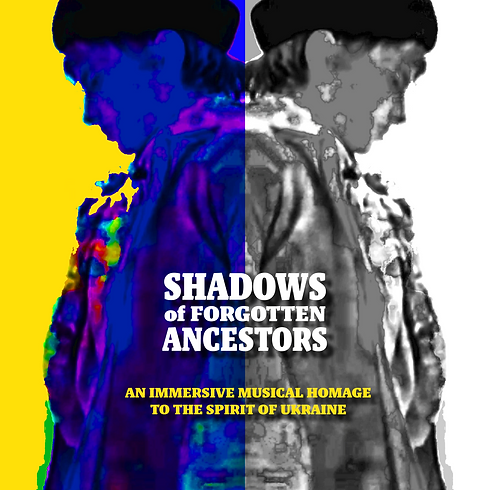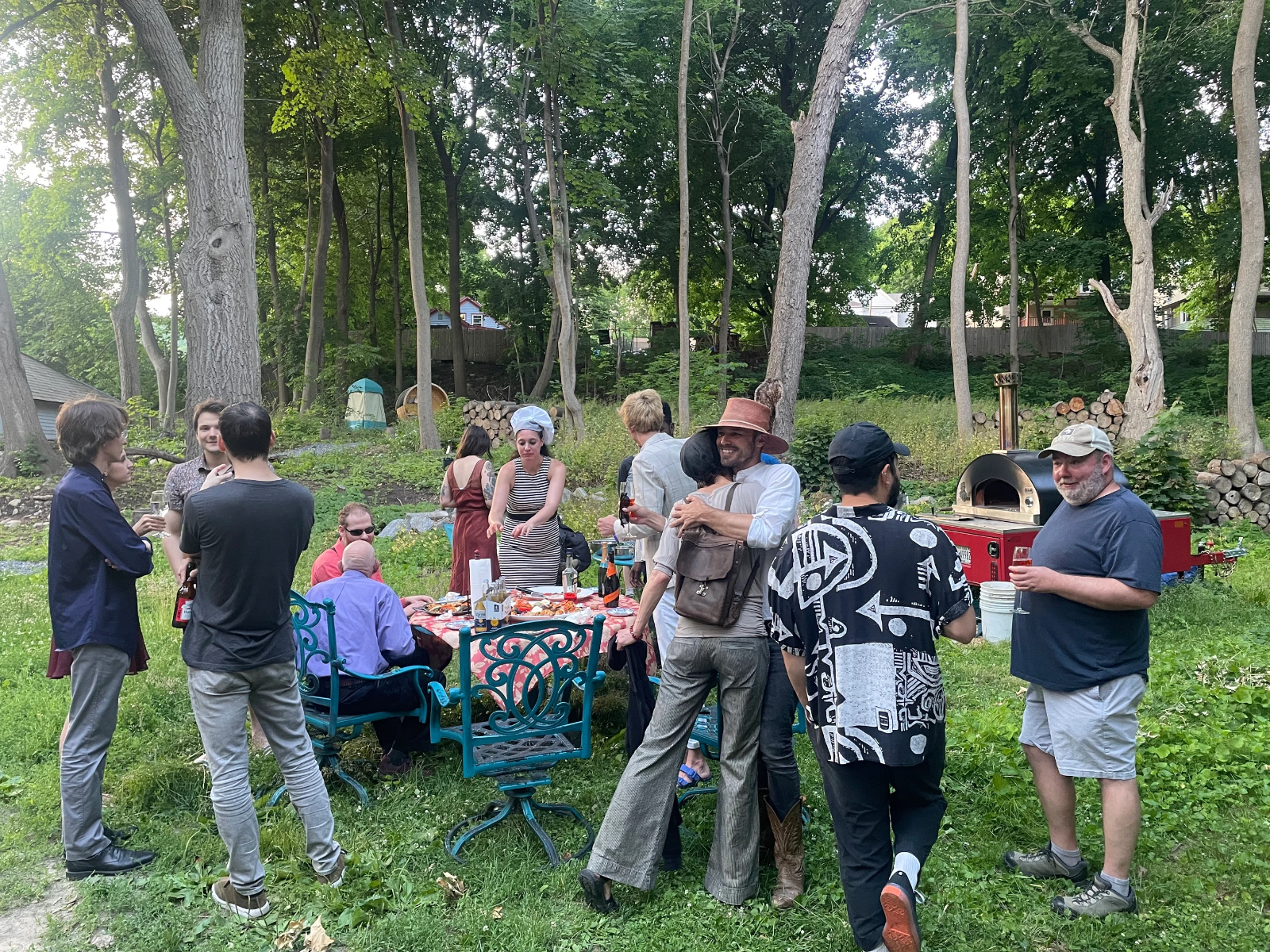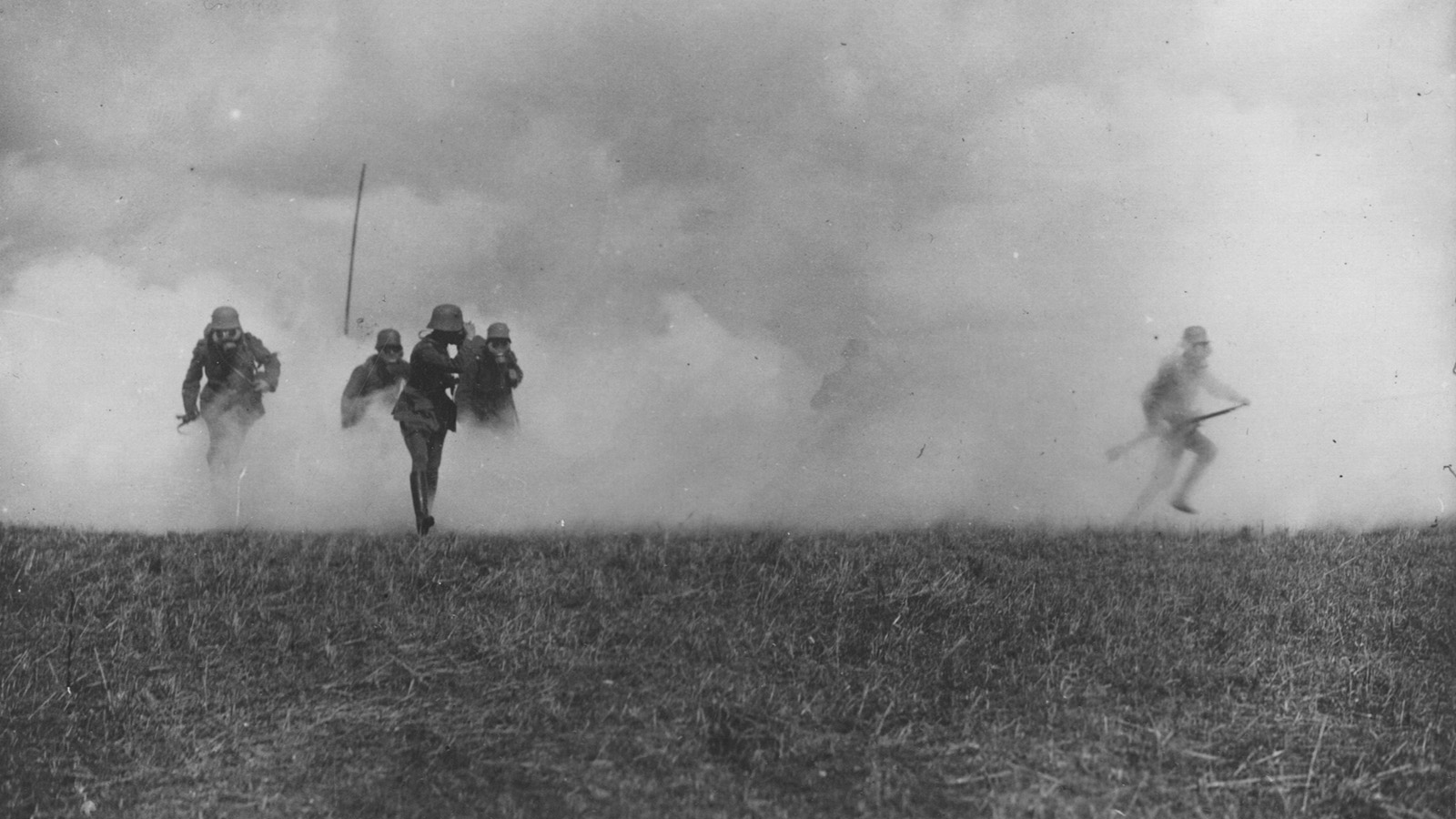Podcast (will-call): Play in new window | Download
Subscribe: RSS
From the streets of Boston to the rolling hills of the Berkshires, we’re taking a deep dive into the remarkable journey of Floating Tower, a unique musical collective. Today, we have the pleasure of speaking with Mátti Kovler, the founding artistic director of Floating Tower, who took his first steps on this path even before being named composer in residence at the Elie Wiesel Center at Boston University. Born out of the multiethnic influences of Boston’s academic and artistic scene, Floating Tower thrives on blending diverse musical traditions into a singular soundscape. Kovler and his fellow musicians—immigrants and refugees alike—have crafted a musical theater that reflects their shared and disparate experiences.
GET TICKETS for Shadows of Forgotten Ancestors

A decade on, and after a residency in New York’s Blue building, Floating Tower has found a new rhythm in the Northern Berkshires. As we’ll hear, Kovler has made this tranquil setting an opportunity for a cultural and artistic exchange, hosting large-scale productions that draw from local and international talents alike. Today, we’ll explore the journey of Floating Tower, the power of music in uniting cultures, the story behind its evocative name, and the upcoming musical spectacular in support of Ukraine hitting Adams Theatre July first and second. Tune in for an enriching discussion on the fusion of music, culture, and community.
NTRVW: Mátti Kovler (rough transcript)
Will Call: And with me on the line is Matti Kovler of Floating Tower. Welcome to the show.
Mátti Kovler: Hi, Jay. Nice to meet you.
Will Call: Well, it’s great to have you here and I’m very excited to talk about this project that has been going on for some time but has a new a new life here in the Berkshires. First of all, tell us a little bit just give us the background of of Floating Tower and what its original goal and purpose is.
Mátti Kovler: Well, I started Floating Tower when I was still living in Boston about ten years ago. I was back then at BU, I was composer in Residence with the Elie Wiesel Center at Boston University. And I, um, I started doing programing with some of the students and some of my fellow musician friends that brings together all kinds of multiethnic influences, if you wish. Some of the people that I was connected with at the time back in Boston were from New England Conservatory, from Berklee College of Music, and many of them were immigrants such as myself and also refugees from Iran, from Syria, from Turkey. So it kind of evolved into a group that most of the musical participants in it are actually either immigrant or refugees, even though this was not this was not by design initially. And the kind of work I was doing was music. I would call it music theater work. So we we had a number of productions that combined these different influences into into one musical soundscape. So, for instance, you know, one of the first productions we did while I was at residence at Boston University was called Quill of the Soul. It started from Hasidic nigun melodies, sacred melodies by Jewish Orthodox Jews. But then some of these melodies were performed by Iranian musicians with in Persian ornament, ornamental singing style, Indian, South Indian classical musicians. And then it you know, and then I realized that it’s it’s very gratifying for me personally, musically speaking, to have, you know, Iranian musicians thinking something in Yiddish and vice versa. So I started experimenting with this, bringing together different vocal traditions, different musical traditions in one production. And this is what Floating Tower began doing. Later, when I moved to New York, uh, Floating Tower started a residence at the Blue building in New York.
Mátti Kovler: It’s a wonderful fringe-like venue in Manhattan, where before the pandemic we would produce 2 or 3 productions a year. And then the pandemic happened. And also before the pandemic. I should say that in the summers we would go to the Berkshires. And I’m not a stranger to the Berkshires. I’ve been here since 2008 when I was a Tanglewood Fellow, and then I kind of kept coming back. I love the Berkshires, but mostly I started back. Back then I stayed in South County, so I would say about seven years ago we started coming to the Berkshires with my group in the summers to do workshops because certain things that are possible in the Berkshires are not possible in New York City. In New York City. You need to fight to, um, to accommodate a two hour rehearsal. And then one of the musicians has to have a baby sitter and somebody needs to leave earlier. Somebody needs to come later. So while at the Berkshires, you basically bring everybody together and we’re just here and we’re, you know, we’re doing musical rehearsals, but also and hiking, you know? Right. So so we would come in the summer to, um, to a place called Trent Park in West Stockbridge. And we, I think for about three summers we would go there and, and the dream was that at some point floating Tower will have a place of our own in the Berkshires to to to also accommodate the refugee musicians but also to, to allow us to workshop our work. And this is sort of what happened in the past three years. That’s that’s the the long answer to your question.
Speaker1: No, that’s that’s that’s perfect. And and I think it gives us a really good foundation to discuss what’s coming up. And yes, when you when you do kidnap a bunch of musicians and bring them to the Berkshires, you get to you get to have them on your schedule. That’s true. That’s correct.
Mátti Kovler: And that’s exactly what that’s exactly what’s happening. And since then, I since then since then, I mastered the kidnaping in a way that for now, you know, now we’re having all the Ukrainian refugees here and all the musicians. And this is a huge production brings together really almost 40 people. And, you know, you will see more than 30 musicians on stage, including Ukrainian teen refugees and members of Ukrainian village voices and different musicians from floating tower and local musicians and local members of community choir. You know, So.
Will Call: It’s going to be huge. It’s going to be huge. I can tell.
Mátti Kovler: That it’s it’s a big it’s a it’s a it’s a big it’s a big production. And we’re very lucky that, you know, the Adams Theater was able to put up with the this extravaganza. But speaking of kidnaping, basically, you know, we decided that every night while they’re staying here at Chase Hill. And I will tell you a little bit about it in a second. But, you know, we also have food for them. We’re cooking every night. You know, we have communal meals. We also sometimes invite community members to these meals. So there’s also dinners. And this is why I sound hoarse, because last night we stayed up so late singing until 3:00 in the morning. So it becomes this big communal event, you know, so it’s not only about it’s not only the performance as much as we care about the performance, it’s also the eight days leading up to the performance is is something that I value also as a as a as a bonding process for all of these people who sometimes haven’t had a chance to play with each other before. Sure.
Will Call: Sure. And it’s it’s it’s sort of like instant family in a way, too, when you’re that close and you’re working that hard and there’s that much creativity flowing, you form very you form bonds typically very, very quickly. And sometimes those bonds can last last a lifetime. And so before you talk about about your the space that you have now, just actually, let’s let’s talk a little bit about the name Floating Tower. I like the description on the website, but why don’t you tell us about where the name comes from?
Mátti Kovler: Well, floating tower is initially is initially a homage to my dear composition mentor, Andre Haidu, who passed away six years ago in Israel. Haidu was a huge influence on me. And and he created a initially he created a body of work called Floating Tower to text from the Mishnah. Mishnah is the Pirates of the Jewish oral tradition. And basically the idea of floating tower in Judaism means that it’s it’s it’s an experience that cannot be you know it’s it’s an experience that is somewhat ephemeral. It’s like fatamorgana of sorts. So, so it speaks to the value of an of experience. And sometimes the best learning can be done, even though the people say that Jews are people of the book. So we care about letters and words. In fact, we we’re also the people of the sound. So sometimes an experience that you experience in a in a theater, for instance, or in a concert, a music experience, in fact, it registers even scientifically and forgive my generalizations, but it does register almost in different places in one’s brain. You know, sometimes you remember you could remember a performance that you saw ten years ago in great detail. That’s true. So, so, so that’s that’s for me. So that’s one aspect of floating tower, which is which is this experience that kind of materializes. And on on another hand, you know, floating tower deals with many floating people.
Mátti Kovler: And I know something about floating because I you know, I’ve been immigrating every ten years of my life, more or less. So, you know, I was born in a country that no longer exists in the Soviet Union. I left it when it was still Soviet Union in 1990, when all the Russian Jews were coming to Israel in droves. Millions. I was ten. Back then, Russia was still communist. And then in my late 20s I came to this country to do my master’s and doctorate in Boston and kind of got married and stayed so, so, you know, the the idea of floating and, and figuring out environments, languages, ways of adapting oneself to a different, you know, modus operandi is also related to the notion of floating tower because many of the floating tower musicians have different immigration stories. You know, we we also have, you know, as you know, refugee musicians and some of our Iranian refugee musicians were able to, even during the previous administration, to secure asylum visas for which is something we’re very proud of. Um, and, you know, and now since Floating Tower is kind of growing and giving the crisis in Ukraine and by the way, my connection with Ukraine was way before the war. I was in Ukraine several times. And, you know, I have significant musical connections there. But because of the crisis in Ukraine, of course, I felt that deep need for floating tower to do something that is particularly related to Ukraine, but also in a way that would be meaningful for us, meaning that I did not want to put up a, you know, a performance of Ukrainian folk song because this is not what Floating Tower is about, right? So this this production really wants to illuminate the multi-ethnic nature of Ukraine that is very often being overlooked in in the media and in discussions of Ukraine, especially in this country.
Mátti Kovler: Um, where, where there’s not enough understanding of the role that Ukraine plays in, you know, European history and beyond the pan-slavic world, you know, the role that Ukraine, for instance, some of the most ancient inhabitants of Ukraine spoke Persian, you know, and there’s a huge Greek connection. For instance, half of Greek mythology as we know it today is actually happening in what today is situated in modern day Ukraine. So, you know, Kyiv was the breadbasket of Athens. Right. And and, you know, and Timothy Snyder, Professor Timothy Snyder has a wonderful series of lectures on YouTube that, you know, I’m fascinated by called The Making of Modern Ukraine that I highly recommend. And he really talks about all of these, you know, ancient world traditions to Ukraine. And this is why in some of the parts of Ukraine, you will hear in the performance, you sometimes hear, you know, influences that are completely non Slavic.
Mátti Kovler: So first of all, don’t forget about the Jews who lived in Ukraine for centuries. And of course, the relationship is very complicated. I say that as somebody whose grandparents are on both sides are Ukrainian Jews and and on both sides, their great grandparents generations were pretty much all murdered in the Holocaust. Some was murdered by in Ukraine by Ukrainians. So it’s it’s a complicated relationship. But even before the Holocaust, there is a relationship that goes back, you know, for centuries between Ukrainians and the Jews. And and one of the interesting and sorry, I’m, you know, swaying a little bit from your original question, but one of the more interesting things that I discovered in doing research in this production is that we are used to talk about Jewish music, like klezmer, you know, as a music that incorporates all kinds of other influences Ukrainian, Polish, Balkan, so forth. But nobody thinks about the the other way. And and when I started discovering Ukrainian peasant chants with words like, of course, I’m like, What’s going on here? That’s a Ukrainian peasant singing a chant with some Yiddish in it. And that got me really started on this project. So because the influences are there and it goes both ways, I was just going to say that.
Will Call: It sounds it sounds like you’re taking a look, a rare look at the way there’s a mutual there’s a mutual flow of there’s a mutual origin to a lot of this that’s exciting. And and I love the I do really love the sort of mystical imagery of floating tower as itrillionepresents a big picture, but also the individuals within your project. I think that’s a really beautiful way of looking at it. And yes, for people who have all of a sudden or who have perhaps not had a home for a long time, either have lost it recently or have been constantly on the move, that feeling of floating, you know, whereas other people might feel that it’s liberating the feeling of of being untethered can. Be unsettling and traumatic for people. Talk to me about how the music plays into a way of stabilizing one’s identity.
Mátti Kovler: I think that’s an excellent question, Jason. In very concrete, very simple ways, You know, so for instance, when I first discovered the, you know, the Ukrainian when I first started working on the Ukrainian project about a year ago in doing research and in fact, the idea was born a few years ago when I was in Ukraine. This is a project that was initially conceived and when I in Ukraine for Ukraine, right? So this, this, this, you know, because of the war, I decided to start workshopping, you know, the project here. And I decided to do it in the Berkshires because we had this incredible opportunity with a new, you know, renaissance of everything that’s going on now in North Adams and Adams. And obviously everybody knows about it, but there’s, you know, post-pandemic renaissance. Everything is blooming. You know, there’s so much, you know, culture and, you know. Right and artsy, you know, fights excuse me, my expression, people like myself coming in, you know, so, so, so I, I saw that Adams Theater would be the perfect laboratory for something like this. And they, they were very kind to to allow us basically to take over for a couple of weeks and just and, and and do the experimentation there. But back to your original question in very concrete ways, you know, there is something well, two ways. First of all, the singing itself, like when you sing this sort of Ukrainian repertoire that is choral, that is highly sophisticated, that uses different kinds of voice production, It’s not an operatic bel canto, right? It’s not what we call in American musical theater belting, singing.
Mátti Kovler: It’s it’s different vocal production that that combines different kinds of from head voice to chest voice, um, to all kinds of very sophisticated melismas. And when it sounds in tune and this production brings together some of the I mean, you will see there is some top tier musical talents involved. So when you hear a choir that is as good as what we have and um, you know, by singing in this choir in a community setting for like an hour or two hours, you already feel like there is a therapeutic effect on you, right? So, so physically, the act of singing does something to our brain. Communal singing is present in all cultures and communal singing of this Ukrainian folk songs as as do the Ukrainian Village Voices members who are participating in our production and describe themselves as a kind of an organism. They it’s not just a choir, it’s an organism that exists. So we were able to tap into the already existing, you know, organism, you know, of this Ukrainian Village Voice tradition and with all kinds of other musicians. We have, you know, Iranian musicians and Egyptian and Lebanese musicians involved. And we all tapped in into that Ukrainian thing. And it affects us in similar ways.
Mátti Kovler: And of course, the other way is instrumentally to play a drone. You play a vassenka, a Ukrainian vassenka that is in 6/8. That is followed by a Lebanese tune that is in 6/8. And you see all the similarities that illuminate the ways in which music traveled. And of course all the six eight stuff probably comes from the Middle East. So it’s, um, it’s so it’s therapeutic just by ways of music making, right? And of course, you know, there’s late night conversations and a lot of food and, um, and, and many ages, you know, this is a production that is done. We have the youngest person here is nine year old Polina, who is a refugee from Kyiv, from Ukraine. She you will see her in the production at some point. You know, she’s holding a teddy bear, you know, and she’s the young marichka and and the oldest person is in her 80s and a community member who has a television show, Rachel Branch in the Berkshires, who is kind of a part of North Adams royalty, you know, the slide family and so forth. So there’s a whole there’s a whole array of people of ages and and in that sense, I think it’s therapeutic because you really come to interact with with your community in, in in ways that are different from what you would normally do in your routine, you know, life, right?
Will Call: When there’s a current that flows between wisdom and innocence and everything in between, there’s definitely the chance for healing. And anyone who’s been in a in a concert choir or a a choir of any kind, I’ve sung in concert choirs myself years ago and. And there is something about the harmonics, the harmonics interacting with human flesh, with the with the with the liquid that we’re made of, with the bones that make up our our frame. There’s just something about having all those harmonics playing on our human form that I think is some sort of audio therapy in and of itself.
Mátti Kovler: Absolutely. And and and the Greeks and the Romans spoke about it in Musica Umana, and the church knows it. Exactly. And we know it in the synagogue and even in Jewish tradition and in the tradition of religious rituals. You know, we we know about this phenomena, you know, in the Jewish temples, in the Jewish temples, even though we have no idea what the ancient Jewish music sounded like, because unfortunately, the first instance of, you know, Jewish written music is from 11th century. But we know that in Jewish temples, you know, 2000 years ago, there were gigantic orchestras with gigantic choirs of, you know, Levites. And, you know, even though we don’t know what the music sounded like, we know that this choir, this choral activity was was at the core of the religious worship. Right. It’s very essential to our experience.
Will Call: I believe it is. I believe that, you know, actually, I’ve even had some friends who are complete atheists who are parts of choirs because they just say they feel better. They it makes them feel wonderful to be singing among a huge group. And there aren’t a lot of humanist choirs. Psychotherapy.
Mátti Kovler: Psychotherapy basically is also sound therapy. And it’s valid. It’s a thing.
Will Call: Of course, there’s music. Food therapy, too. Eating together is at the core. I mean, obviously, that’s that’s the very the first social thing humans have ever done is, is sharing food together, I’m guessing. And when you cook together and eat together after you’ve been kidnaped and brought to the Berkshires, then you do get to you get to. You get to feel the nourishment, the nourishment that comes from those late night conversations and the good smells and the good tastes and just the very act of participating in a meal together. And that’s at Cass Hill. Is that is that where Chase Hill?
Mátti Kovler: But I, I, I also I just want to add that not everybody has been kidnaped and brought to the Berkshires on the outside because a lot of the project participants are rooted deeply rooted in the Berkshires either born here, were either born here and grew up here. For instance, we’re collaborating with a wonderful wood player, Bob Davis, who was born here in North Adams and grew up here and knows literally everyone. And he as a child visited the Chase Hill estate that we’re now occupying. And he remembers very well. So, you know, there are multiple connections. And in terms of food also, we are collaborating with a dear friend of mine, Deborah Fishman, who has an organization called Fed Social, which is exactly what they do in Ireland. They feed people. And this is why, you know, I’ve been I’ve learned that it’s so much better to do with food. So I’m bringing you know, Deborah is here with us and, you know, they’re doing all the communal cooking. And even though here at Chase Hill, we’re not fully set up, we don’t have a you know, we don’t have a commercial kitchen or anything like that. But, um, you know, but we’re cooking every night for 40 people. I love it. I love it. Yeah. And also, we serve lunches, you know, for 40 people at the, you know, because we don’t want to waste time, you know? So.
Will Call: Okay. No, no, that’s. That’s true. When you’ve got such a tight schedule, every every second counts. Let’s talk. And since I know you do have a tight schedule, let’s let’s get to the let’s get to this. Shadows of forgotten ancestors that the name of this performance that’s taking place on July 1st and second. Are there still tickets available?
Mátti Kovler: There are still tickets available, although not many. We’ve seen a big uptick. Tickets just yesterday. And I should say that if you’re a member of local community in the Berkshires and you don’t have money and you still want to see the show, you could see it for free. You just go on the Adams Theater website and you register for a community member tickets. But you should also know that there’s various levels of tickets for 20, 40 bucks and 75 bucks and all of the proceeds, literally all of them, not the profits, the proceeds, all of the proceeds go towards Ukraine. So that’s the arrangement with the theater. So money, the ticket money is going to go to a good cause. It goes tourism for Ukraine. Wow. Now, but, you know, it’s going to I think it’s going to get filled in the next couple of days. So if you’re listening to it and you want to come, it’s this Saturday and Sunday. It’s at 7 p.m. Adams Theater and Adams Theater is located in the town of Adams on the main street that says Adams on it and 27 Pike Street. And it’s a new it’s a new thing.
Will Call: Yes. Yeah. We we have been waiting for that. I mean, it’s been up for a little while now. But the watching the progress of the Adams Theater come alive has been interesting. All right. Well, I. I will. You know, with this podcast episode, I’m sure that’ll probably help fill those last few remaining seats. A lot of my listeners are. I would wager almost all of my listeners are heavily into the local music scene. And so this is going to be a particular interest to them. Marty I do hope that we’ll have you back on the show to talk about more projects that are coming up. Thank you. Do you have something on the calendar for 2024 or even later this year?
Mátti Kovler: Well, I have a personal project because we’re expecting a child in four weeks. So that’s what my that’s in the immediate in the immediate future of my.
Will Call: That’s that’s a well I won’t I won’t congratulate you until after the baby is.
Mátti Kovler: Born. Thank you very much.
Will Call: But but I will congratulate. Right. I will. I’ll congratulate you afterwards. Tell me something, though, before I let you go. Do you do you know when my two children were in utero, we did play some music and sing a lot. Do you do you do that around the house?
Mátti Kovler: So she’s not with us in the house physically, she’s in Wisconsin, but she does have a playlist that she’s playing every day. And the playlist includes all that Persian stuff and the Jewish stuff and Ukrainian folk chant, as well as some Bach and Mozart, which is good for brain development. So all covered, trust me.
Will Call: Good, good, good. Well, I wish you the best of luck with that. And. And is this your first? Yep. Well, you’ll you’ll just. There will be. There will be challenges. I’m 17 years into it, and I’m still alive. So you’ll survive. And I’m looking forward to I’m looking forward to the show. And I will put a link to Floating Tower which is just floating tower.com in the show notes. All right. Thanks so much for being on the show. We’ll talk again.
Mátti Kovler: Bye bye. Thank you very much. Take care. Bye bye.


















I know that this was a transcript but the Adams Theater address is 27 PARK Street.
KIEV is the way a russian would say it as it is a russified (Stalin’s strategy to erase Ukrainian culture) way os spelling the city.
KYIV is the Ukrainian and proper way.
Thank you so much for the correction, Roman! That’s exactly how we improve — through the assistance of our readers.
Jason Velázquez,
Editor